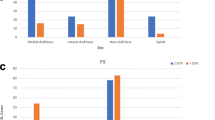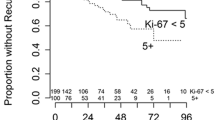Summary
Objective
Recurrence of apparently completely resected benign meningiomas is a rather frequent event, the mechanisms of which are still unclear. The aim of this study is to define the pathological features, proliferation indexes, growth factors and hormone receptor expression in predicting the meningioma recurrence.
Methods
Two groups of 50 completely resected benign WHO I meningiomas, with and without recurrence respectively, have been reviewed. Tumor location, consistency, vascularity, and histological types have been considered. Immunohistological studies include mitotic index (MI), Ki-67 LI, estrogen and progesterone receptors (ER and PR), Vascular Endothelial Growth Factor (VEGF), Epidermal Growth Factor (EGF), and Bcl-2. All these factors have been correlated with the recurrence.
Results
The tumor recurrence was not correlated with the patient age, tumor location, consistency, vascularity and histology. There was not difference in the histological pattern between local and diffuse recurrences. M.I. and Ki-67 LI were significantly correlated with the recurrence (P<0.0001). PR negativity had a strong predictive value of recurrence (P<0.0001), whereas the ER status was not relevant. VEGF and EGF-R were not correlated with the recurrence of meningiomas, whereas the Bcl-2 protein positivity showed a tendency to the significativity (P=0.0294). The negative association between Bcl-2 and PR is an interesting finding of our study.
Conclusions
Higher MI and Ki-67 LI and PR negativity are predictive factors of recurrence of benign (WHO I) completely resected meningiomas, particularly when Bcl-2 positivity is associated.
Similar content being viewed by others
References
Jaaskelainen J, 1986 Seemingly complete removal of histologically benign intracranial meningioma: late recurrence rate and factors predicting recurrence in 657 patients A multivariate analysis Surg Neurol 26: 461–469
Mirimanoff RO, Dosoretz DE, Linggood RM, Ojemann RG, Martuza RL, 1985 Meningioma: analysis of recurrence and progression following neurosurgical resection J Neurosurg 62: 18–24
Jaaskelainen J, Haltia M, Servo A, Atypical and anaplastic meningiomas: radiology, surgery, radiotherapy, and outcome Surg Neurol 25: 233–242, 1986
Adegbite AB, Khan MI, Paine KW, Tan LK, The recurrence of intracranial meningiomas after surgical treatment J Neurosurg 58: 51–56, 1983
Baird M, Gallagher PJ, Recurrent intracranial and spinal meningiomas: clinical and histological features Clin Neuropathol 8: 41–44, 1989
Philippon J, Cornu P, 1991 The recurrence of meningiomas. In: Al-Mefty O, (ed). Meningiomas Raven Press New York, 87–105
Nakasu S, Nakasu Y, Nakajima M, Matsuda M, Handa J, Preoperative identification of meningiomas that are highly likely to recur J Neurosurg 90: 455–462, 1999
Ho DM, Hsu CY, Ting LT, Chiang H, Histopathology and MIB-1 labeling index predicted recurrence of meningiomas: a proposal of diagnostic criteria for patients with atypical meningioma Cancer 94: 1538–1547, 2002
Simpson D, 1957 The recurrence of intracranial meningiomas after surgical treatment J Neurol Neurosurg Psychiatr 20: 22–39
Burger PC, Scheithauer BW, Vogel FS, 2002 Surgical Pathology of the Nervous System and its Covering. (4th ed). Churchill Livingstone New York, 1–66
Ironside JW, Moss TH, Louis DN, Lowe JS, Weller RO, 2002 Diagnostic Pathology of the Nervous System Churchill Livingstone London, 360
Ohta M, Iwaki T, Kitamoto T, Takeshita I, Tateishi J, Fukui M, MIB1 staining index and scoring of histologic features in meningioma. Indicators for the prediction of biologic potential and postoperative management Cancer 74: 3176–3189, 1994
Kolles H, Niedermayer I, Schmitt C, Henn W, Feld R, Steudel WI, Zang KD, Feiden W, Triple approach for diagnosis and grading of meningiomas: histology, morphometry of Ki-67/Feulgen stainings, and cytogenetics Acta Neurochir (Wien) 137: 174–181, 1995
Langford LA, Cooksley CS, DeMonte F, Comparison of MIB-1 (Ki-67) antigen and bromodeoxyuridine proliferation indices in meningiomas Hum Pathol 27: 350–354, 1996
Matsuno A, Fujimaki T, Sasaki T, Nagashima T, Ide T, Asai A, Matsuura R, Utsunomiya H, Kirino T, Clinical and histopathological analysis of proliferative potentials of recurrent and non-recurrent meningiomas Acta Neuropathol (Berl) 91: 504–510, 1996
Madsen C, Schroder HD, Ki-67 immunoreactivity in meningiomas – determination of the proliferative potential of meningiomas using the monoclonal antibody Ki-67 Clin Neuropathol 16: 137–142, 1997
Hsu DW, Efird JT, Hedley-Whyte ET, MIB-1 (Ki-67) index and transforming growth factor-alpha (TGF alpha) immunoreactivity are significant prognostic predictors for meningiomas Neuropathol Appl Neurobiol 24: 441–452, 1998
Karamitopoulou E, Perentes E, Tolnay M, Probst A, Prognostic significance of MIB-1, p53, and bcl-2 immunoreactivity in meningiomas Hum Pathol 29: 140–145, 1998
Perry A, Stafford SL, Scheithauer BW, Suman VJ, Lohse CM, The prognostic significance of MIB-1, p53, and DNA flow cytometry in completely resected primary meningiomas Cancer 82: 2262–2269, 1998
Nakaguchi H, Fujimaki T, Matsuno A, Matsuura R, Asai A, Suzuki I, Sasaki T, Kirino T, Postoperative residual tumor growth of meningioma can be predicted by MIB-1 immunohistochemistry Cancer 85: 2249–2254, 1999
Lanzafame S, Torrisi A, Barbagallo G, Emmanuele C, Alberio N, Albanese V, Correlation between histological grade, MIB-1, p53, and recurrence in 69 completely resected primary intracranial meningiomas with a 6 year mean follow-up Pathol Res Pract 196: 483–488, 2000
Nakasu S, Li DH, Okabe H, Nakajima M, Matsuda M, Significance of MIB-1 staining indices in meningiomas: comparison of two counting methods Am J Surg Pathol 25: 472–478, 2001
Moller ML, Braendstrup O, No prediction of recurrence of meningiomas by PCNA and Ki-67 immunohistochemistry J Neurooncol 34: 241–246, 1997
Abramovich CM, Prayson RA, Histopathologic features and MIB-1 labeling indices in recurrent and nonrecurrent meningiomas Arch Pathol Lab Med 123: 793–800, 1999
Hunt DP, Freeman A, Morris LS, Burnet NG, Bird K, Davies TW, Laskey RA, Coleman N, Early recurrence of benign meningioma correlates with expression of mini-chromosome maintenance-2 protein Br J Neurosurg 16: 10–15, 2002
Hsu DW, Efird JT, Hedley-Whyte ET, Progesterone and estrogen receptors in meningiomas: prognostic considerations J Neurosurg 86: 113–120, 1997
Fewings PE, Battersby RD, Timperley WR, Long-term follow up of progesterone receptor status in benign meningioma: a prognostic indicator of recurrence? J Neurosurg 92: 401–405, 2000
Strik HM, Strobelt I, Pietsch-Breitfeld B, Iglesias-Rozas JR, Will B, Meyermann R, The impact of progesterone receptor expression on relapse in the long-term clinical course of 93 benign meningiomas In Vivo 16: 265–270, 2002
Verheijen FM, Donker GH, Viera CS, Sprong M, Jacobs HM, Blaauw G, Thijssen JH, Blankenstein MA, Progesterone receptor, bcl-2 and bax expression in meningiomas J Neurooncol 56: 35–41, 2002
Kalkanis SN, Carroll RS, Zhang J, Zamani AA, Black PM, Correlation of vascular endothelial growth factor messenger RNA expression with peritumoral vasogenic cerebral edema in meningiomas J Neurosurg 85: 1095–1101, 1996
Goldman CK, Bharara S, Palmer CA, Vitek J, Tsai JC, Weiss HL, Gillespie GY, Brain edema in meningiomas is associated with increased vascular endothelial growth factor expression Neurosurgery 40: 1269–1277, 1997
Provias J, Claffey K, delAguila L, Lau N, Feldkamp M, Guha A, Meningiomas: role of vascular endothelial growth factor/vascular permeability factor in angiogenesis and peritumoral edema Neurosurgery 40: 1016–1026, 1997
Bitzer M, Opitz H, Popp J, Morgalla M, Gruber A, Heiss E, Voigt K, Angiogenesis and brain oedema in intracranial meningiomas: influence of vascular endothelial growth factor Acta Neurochir (Wien) 140: 333–340, 1998
Lamszus K, Lengler U, Schmidt NO, Stavrou D, Ergun S, Westphal M: Vascular endothelial growth factor, hepatocyte growth factor/scatter factor, basic fibroblast growth factor, and placenta growth factor in human meningiomas and their relation to angiogenesis and malignancy Neurosurgery 46: 938–947, 2000 (discussion 947–938)
Pietsch T, Valter MM, Wolf HK, von Deimling A, Huang HJ, Cavenee WK, Wiestler OD, Expression and distribution of vascular endothelial growth factor protein in human brain tumors Acta Neuropathol (Berl) 93: 109–117, 1997
Yamasaki F, Yoshioka H, Hama S, Sugiyama K, Arita K, Kurisu K, Recurrence of meningiomas Cancer 89: 1102–1110, 2000
Reubi JC, Horisberger U, Lang W, Koper JW, Braakman R, Lamberts SW, Coincidence of EGF receptors and somatostatin receptors in meningiomas but inverse, differentiation-dependent relationship in glial tumors Am J Pathol 134: 337–344, 1989
Adams EF, Schrell UM, Fahlbusch R, Thierauf P, Hormonal dependency of cerebral meningiomas. Part 2: In vitro effect of steroids, bromocriptine, and epidermal growth factor on growth of meningiomas J Neurosurg 73: 750–755, 1990
Abramovich CM, Prayson RA, Apoptotic activity and bcl-2 immunoreactivity in meningiomas. Association with grade and outcome Am J Clin Pathol 114: 84–92, 2000
Konstantinidou A, Korkolopoulou P, Patsouris E, Mahera H, Hranioti S, Kotsiakis X, Davaris P, Apoptosis detected with monoclonal antibody to single-stranded DNA is a predictor of recurrence in intracranial meningiomas J Neurooncol 55: 1–9, 2001
Konstantinidou AE, Korkolopoulou P, Mahera H, Kotsiakis X, Hranioti S, Eftychiadis C, Patsouris E, Hormone receptors in non-malignant meningiomas correlate with apoptosis, cell proliferation and recurrence-free survival Histopathology 43: 280–290, 2003
Author information
Authors and Affiliations
Corresponding author
Rights and permissions
About this article
Cite this article
Maiuri, F., De Caro, M., Esposito, F. et al. Recurrences of meningiomas: predictive value of pathological features and hormonal and growth factors. J Neurooncol 82, 63–68 (2007). https://doi.org/10.1007/s11060-005-9078-9
Received:
Accepted:
Published:
Issue Date:
DOI: https://doi.org/10.1007/s11060-005-9078-9




